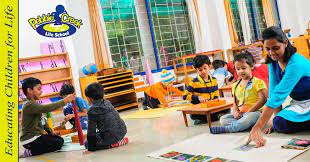Models of Education – The Montessori Method
There are many different models of education, each with its own advantages and disadvantages. One model that has gained popularity in recent years is the Montessori method. The Montessori method is based on the philosophy that children are naturally curious and should be given the opportunity to explore their interests. This hands-on approach to learning encourages creativity and independent thinking. In this blog post, we will take a closer look at the Montessori method, its advantages and disadvantages, and whether it is right for your child.
What is the Montessori Method?
The Montessori Method is a child-centered educational approach that emphasizes independence, hands-on learning, and collaborative play. In Montessori classrooms, students are free to move about and choose their own work, with the teacher acting as a guide. Montessori education is based on the belief that children are naturally curious and motivated to learn, and that they learn best through concrete, hands-on experience.
Montessori classrooms are typically designed to promote independence and self-regulation. Materials are presented in an orderly fashion and are easily accessible to students. Classroom activities are designed to encourage students to explore their surroundings, make choices, and take responsibility for their own learning.
The Montessori Method has been shown to be effective in promoting academic achievement and social-emotional development in children. Studies have found that Montessori students outperform their peers on standardized tests, and they also report higher levels of intrinsic motivation, engagement, and satisfaction with school.
History of the Montessori Method
The Montessori method is a child-centered educational approach that emphasizes individualized learning. It was developed by Italian physician and educator Maria Montessori in the early 20th century.
The Montessori method is based on the belief that children are naturally curious and capable of learning if they are given the opportunity to explore their own interests. In a Montessori classroom, materials and activities are designed to promote self-directed learning and encourage children to think independently.
Montessori believed that all children have the potential to reach their full potential, regardless of their socioeconomic background or circumstances. She believed that every child should have access to quality education, and her methods have been proven to be effective for children of all abilities.
The benefits of a Montessori education
When it comes to choosing a school for your child, there are many factors to consider. But one type of school that may be worth considering is a Montessori school.
Montessori schools offer a unique educational approach that can provide many benefits for your child. Here are just a few of the benefits of Montessori education:
1. Montessori schools emphasize hands-on learning.
One of the key features of Montessori schools is that they emphasize hands-on learning. This means that your child will have the opportunity to learn through doing, rather than simply listening to lectures or watching videos.
2. Montessori schools encourage independence and self-direction.
Another benefit of Montessori schools is that they encourage independence and self-direction. In a Montessori classroom, children are encouraged to work at their own pace and choose their own activities. This can help them develop into independent thinkers and learners who are not afraid to take charge of their own education.
3. Montessori schools foster social and emotional development.
In addition to promoting academic success, Montessori schools also foster social and emotional development. Children in a Montessori environment learn to cooperate with each other and resolve conflicts peacefully. They also develop strong self-esteem and confidence in their ability to succeed.
How the Montessori Method works
The Montessori Method is an educational approach that is based on the work of Italian physician and educator Maria Montessori. The Montessori Method emphasizes independent learning, hands-on experience, and collaboration in a small classroom setting.
The Montessori Method has several key components:
1. Classrooms are organized into areas where children can choose to work independently or with a group.
2. Children are encouraged to move freely around the classroom and to interact with materials at their own pace.
3. Teachers provide individualized attention and guidance to each child.
4. There is a focus on developing life skills such as self-confidence, concentration, and persistence.
Pros and Cons of the Montessori Method
There are many different models of education, and the Montessori Method is just one of them. This method was developed by Italian physician and educator Maria Montessori in the early 1900s. The Montessori Method is based on the belief that children are natural learners and should be allowed to explore their own interests at their own pace.
There are both pros and cons to the Montessori Method. Some of the pros include that it allows children to learn at their own pace, fosters independence and self-motivation, and encourages creativity. Some of the cons include that it can be expensive, there is a lack of standardization, and some parents may not feel comfortable with the amount of freedom given to children.
Are there any alternatives to the Montessori Method?
There are a number of alternative educational models to the Montessori method. Some of these include Waldorf, Reggio Emilia, Bank Street, HighScope, and many more. Each model has its own unique approach to education, so it is important to do your research to find the one that best fits your child’s needs.
Conclusion
The Montessori Method is a model of education that has been gaining popularity in recent years. This method focuses on individualized instruction and hands-on learning, which allows children to learn at their own pace. If you are looking for an alternative to traditional schooling, the Montessori Method might be worth considering.





